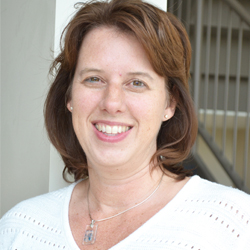In the Spotlight
 Susan Bowman
Susan Bowman
Susan graduated as physiotherapist from the University of Manitoba in 1989. She worked in a clinical role until 1996, when she started taking on administrative roles. Being seconded to work on an Interprofessional practice with the Region and the University of Manitoba not only lead to a project with Health Canada, it helped her evolve in her role as manager while maintaining a connection to clinical work. These projects helped inspire her proposal to EXTRA. She is currently the manager of the physiotherapy department and orthopaedic clinic at the Grace General Hospital.
"Sometimes the strongest leaders are not the formal manager of the unit. So much of what happens around Collaborative Care is the informal leadership and how people share that role and how they work with each other."
What's a typical day like?
My role varies so much. In the non-nursing world, we end up doing a lot of operational elements because we don't have the same structured support. The first thing I do in the morning is look at staffing. If someone's away sick, quite often I'll do the clinical work myself to help keep patients flowing.
Staff and student clinical orientation is a piece of what I do. I have staff working in every area of the hospital so every single program where I'm involved in planning, I look at the role and function and process and how physio fits into that role.
The biggest part of what I do is figure out how to enable the staff to do the work we need to do. Within that, anything and everything can come up. I never know what I will get called into. For me, it's great to see what my staff can do, what we can accomplish, and how we can get patients out the door everyday.
In a management position, you're everything to your staff. You're there for them when they've had a fight with a doc on the ward, if a personal crisis has happened - you're there for everything. It's rewarding. None of us would stay at this if we didn't get that reward back.
Why Collaborative Care?
Work around leadership and Collaborative Care has been a love throughout my career. To me Collaborative Care is shared leadership. We have formal leaders on a team but sometimes the strongest leaders are not the formal manager of the unit. So much of what happens around Collaborative Care is the informal leadership and how people share that role and how they work with each other.
What are your reflections on Collaborative Care?
People don't know they're not being collaborative, but they think they're being collaborative. It's the people who have the confidence to know it's okay to listen and extend the collaboration to the person they're caring for. We think we know best but people are the experts in their bodies because they're the one that's living it.
As a team you need to ensure the patient and family have an equal voice at the table. You need to listen to the fact that sometimes they're going to make a bad decision regardless of what the team says. And we need to be okay with that and not so prescriptive because we're the health experts.
What gets you out of bed in the morning?
I love my staff. There are days when we're like why am I doing this? But I love the people that I work with. I love the environment that I work with. We need to have that because some days you wouldn't want to get out of bed. It's the people. It's so much the people.
What has had a profound influence on your practice?
Where I am now took a turn because of Janet Bjornson and getting a tap on the shoulder to be seconded for the interprofessional student placement project. If I hadn't done that, I don't that know we would be here today. I thank Janet for that, for adding another dimension to my practice and what I'm doing.
Before that, had really good mentors in health care that have pushed me and stretched me to take on national leadership positions, to go to the Dorothy Wyllie Institute, to not be happy just with the status quo. It's been a real bonus to have great people within my work environment and within my profession that have given me that ability to take those risks and to take those steps.
If I hadn't by chance been asked to do this one project, wouldn't have met Kathleen, wouldn't have moved onto work with Health Canada, sat over drinks one day, decided to find Paul and do EXTRA. Sometimes it's just you're in the right place at the right time. It's that butterfly effect . . . one thing can completely change your direction.
What's next?
We're so pleased with work we've done but we need it to get traction. I've been asked to sit on a few committees as a result. I'm not ready to take on anything new but rather figure out how Collaborative Care becomes embedded in WRHA. That's the next journey - to figure out how we make this part of the fabric of what teams just do.
